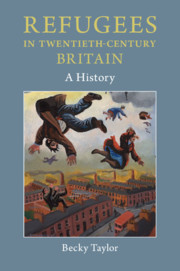Book contents
- Refugees in Twentieth-Century Britain
- Refugees in Twentieth-Century Britain
- Copyright page
- Dedication
- Contents
- Acknowledgements
- List of Abbreviations
- Introduction
- 1 Protectionism vs Internationalism
- 2 Post-War Settlement
- 3 Rivers of Blood
- 4 Marketisation and Multiculturalism
- 5 A New World Order
- Bibliography
- Index
5 - A New World Order
Conclusion
Published online by Cambridge University Press: 23 April 2021
- Refugees in Twentieth-Century Britain
- Refugees in Twentieth-Century Britain
- Copyright page
- Dedication
- Contents
- Acknowledgements
- List of Abbreviations
- Introduction
- 1 Protectionism vs Internationalism
- 2 Post-War Settlement
- 3 Rivers of Blood
- 4 Marketisation and Multiculturalism
- 5 A New World Order
- Bibliography
- Index
Summary
The end of the twentieth century saw a significant change – quantitatively and qualitatively – in refugees coming to Britain. As the post-Cold War world saw growing numbers fleeing a constellation of state collapse, civil war, environmental disaster and economic stagnation, 1990s Britain saw an absolute increase in the number of asylum applications. It also saw a shift away from the entry of distinct blocks of refugees towards the piecemeal entry of individuals seeking refuge. These two trends came together, combining with Britain’s continued restriction of extra-European immigration, to ensure two things. First, that Britain’s stated commitment to refugee rights via the Refugee Convention became undermined by a determination to reduce the number of successful asylum applications. Through repeated legislation, the burden of proof an individual needed to make a successful application became ever greater. Second, despite assertive grassroots activism, new measures – dispersal, detention and ever-more restricted access to welfare support and legal employment – all served to marginalise asylum seekers from the mainstream population. While these sought to underline the difference between, and the competing claims of, asylum seekers and the ‘hard working poor’, in fact both faced the consequences of a retreating state, shrinking affordable housing and the erosion of universal welfare.
- Type
- Chapter
- Information
- Refugees in Twentieth-Century BritainA History, pp. 271 - 284Publisher: Cambridge University PressPrint publication year: 2021

